Vladivostok is not for the light of heart! Past Review
By Lizbeth Mendoza (The University of Texas at Austin) - abroad from 02/01/2017 to 05/25/2017 with
SRAS: Vladivostok - The Russian Far East
I was able to grasp the fundamentals so I can further improve my language skills independently. Learning about local social issues, specifically migration issues, helped expand my own study on migration for my graduation work at my local university. I also learned more about local perspective on government and corruption. I gained a new perspective on nationalism. I definitely think it was worthwhile to visit.
Review Photos
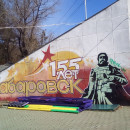
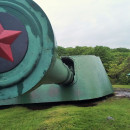
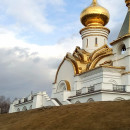
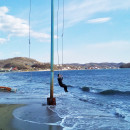
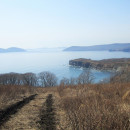
Personal Information
| How much international exposure did you have prior to this program? | 1 month - 6 months |
Review Your Program
|
* Overall educational experience
Academic rigor, intensity, resources, etc. |
On the Russian language classes, I enjoyed the rigor of the courses. However, placement into ones language level was somewhat confusing. There are too few levels between the most difficult course and the moderate course. As for the policy review course, it would help to inform students about necessary prior knowledge of policy briefs prior to the course. It was a very intense course. |
|
* Host Country Program Administration
On-site administration of your program |
The administration staff always worked on time, and were very dedicated to each student. They provided us with information weeks in advance and would remind us of important events and paperwork. They were friendly and welcoming. |
|
* Housing:
How satisfied were you with your living arrangements? |
We paid around $8000 dollars for the whole semester, but we slept on thin mattresses in comparison to students who paid $1000 and slept in nice rooms. The hot water was shut off constantly, and even Russian students have complained that this is a big issue to them. Finally, the kitchens were closed very early, and the study room was hard to access. Although, the dorm mother was helpful and understanding. My roommate, however, was very accommodating. There was a language barrier since my Russian was limited, but she was very understanding and helped me when she could. For example, getting groceries, doing laundry, and cleaning duties. |
| * Food: |
There were many options available on campus and around campus! The wait times were minimal, although the prices on some food options were a bit expensive. However, the local grocery store is a 5 minute walk from campus, so one could easily buy groceries and make cheap meals in the kitchens. There is also a good convenience store located in the basement of campus. Food there is expensive. The quality of food was always high. It was delicious, albeit simple. |
|
* Social & Cultural Integration:
How integrated did you feel with the local culture? |
It really helped to meet local students and walk around the city with them. They helped introduce us to other locals or local culture, such as shopping, living, transportation, and dining. Unfortunately, a language barrier always made it hard to fully integrate oneself into the local culture. Furthermore, there is still existent hostility toward Asian and Central Asian cultures as well as other darker skinned people. I felt welcome, but at the same time felt as if many people's eyes were on me. The older generation was surprisingly easier to talk to. Political opinions were accepted, although not necessarily invited. Gender stereotypes/roles are still in place, but acceptance of change seems to be moving inside the younger generation. I enjoyed the local culture, but feel that a longer stay would help further integrate any student into the city. |
|
* Health Care:
How well were health issues addressed during the program? |
I myself only had a physical examination done upon arrival to Russia. The wait was long, and we were sent from office to office to find a doctor available for the examination and to sign the paperwork. However, the doctors were kind and got straight to the point of every part of the examination. The examination was relatively cheap, although I don't remember the exact amount. |
| * Safety: |
I felt relatively safe around campus. However, near the end of our stay, there were a few incidents in and around our city. For example, the arrest of protesters in Vladivostok, the shooting in Khabarovsk days before our arrival in April, and an attempted terrorist attack in Sakhalin. Fortunately, the police department was prepared and took precautions for the city's events like Labor day and Victory day. |
| If you could do it all over again would you choose the same program? |
Yes
I enjoyed my classes and my classmates, but I think that because it was my first time abroad and my language skill was very low, I spent most of my time studying to catch up to the level of most students. Therefore, I missed many other issues, cultural/social events, language opportunities, and opportunities to further enjoy the terrain. |
Finances
|
* Money: How easily were you able to live on a student's budget?
(1 = not very easy/$200+ on food & personal expenses/week, 2.5 = $100/week, 5 = very easily/minimal cost) |
I arrived with $1000 for food/living expenses. Trips and activities offered by the university consumed most of that budget. |
| Not including program expenses, about how much money did you spend on food and other expenses each week? | $50 |
| Do you have any general money-saving tips for future study abroad participants? | Pick and choose what activities are most important to you. If you have a limited budget, opt for fruits and vegetables when grocery shopping. Fresh bread is somehow cheaper than packaged, and it tastes better. Going to bars is fun, but on a limited budget, you should withdraw a limited amount so you don't overcharge your credit card. To save money on drinking water, use the hot water in the kitchens; provided that it's safe to drink. Walk or plan out your schedule to take the bus. Avoid buying clothes abroad; the prices are usually inflated. |
Language
| * Did your program have a foreign language component? | Yes |
|
How much did the program encourage you to use the language?
0 = No encouragement, 5 = frequent encouragement to use the language |
Although there were some places where one could speak English/Chinese/Korean, it was encouraged to speak Russian if you truly wanted to immerse yourself in the local culture. Classes were based on participation, so speaking was highly encouraged and helpful. The teachers were kind and built confidence, which helped improve our comprehension. The textbooks were helpful to understand the basics, but it was the class activities which proved to be the most helpful. |
| How would you rate your language skills at the beginning of the program? | Beginner |
| How would you rate your language skills at the end of the program? | Intermediate |
| What was the highest level language course you had completed prior to departure? | Intensive Russian II |
| How many hours per day did you use the language? | |
| Do you have any tips/advice on the best ways to practice the language for future study abroad participants? | Watch movies online or with friends, with subtitles at first, and then without. Listen to local music; go to bars or concerts with friends to grasp language in hard-to-hear places. Walk around and simply listen to the spoken language to catch onto accents and inflections. Speak whenever you can. It might be difficult to make friends, but if you can, make a Russian-speaking friend and speak in Russian as often as you can. Stick to one or two people, because jumping around to other conversational partners will only help you review introductory conversational skills. Speaking to only one person at a time will help you move onto larger topics. Read books, but it's not necessary to understand every word, just the meaning. You are studying to learn, not necessarily to be a translator. Overthinking your progress will only stress you out. Take it slow, take lots of breaks, relax, and have fun. |
Other Program Information
|
* Where did you live?
Select all that apply |
|
|
* Who did you live with?
Select all that apply |
|
|
* Who did you take classes with?
Select all that apply |
|
| About how many local friends did you make that you will likely keep in touch with? |
A Look Back
| * What did you like most about the program? |
|
| * What could be improved? |
|
| * What do you know now that you wish you knew before going on this program? | It's really hard to live here by yourself without knowing enough Russian. I also wish I had known more about the animosity toward the Chinese and Ukrainians. |
Reasons For Studying Abroad
| To help future students find programs attended by like-minded individuals, please choose the profile that most closely represents you. |
The Academic or LinguistYou went abroad with specific academic goals in mind; the program credentials and rigor of your coursework abroad were very important to you. You had a great time abroad, but never lost sight of your studies and (if applicable) were diligent with your foreign language study. Good for you! |








